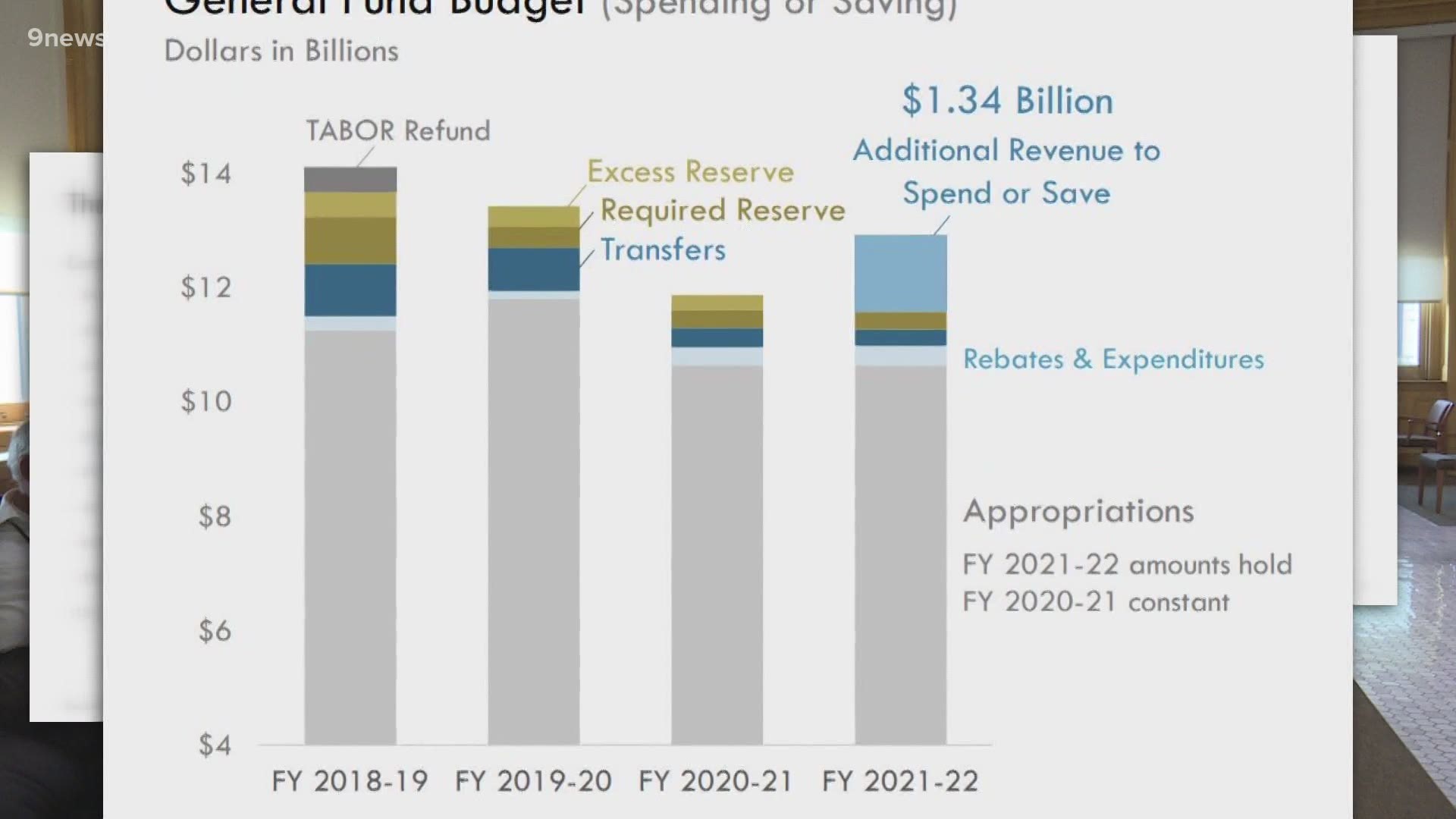DENVER — Colorado’s general fund revenue is expected to fall 4.9% this fiscal year and another 10.5% in the 2020-21 fiscal year – evidence of the wide-reaching economic impact of the novel coronavirus pandemic, which virtually shut down the state for weeks.
This is according to the quarterly economic forecast released Friday by the Governor’s Office of State Planning and Budgeting (OSPB), which said a recovery could be longer for some sectors like tourism and energy, which were hit the hardest by the pandemic.
Before COVID-19 arrived in the state, Colorado’s general fund was actually expected to end the year $174.1 million above its statutory reserve amount, the governor’s office said. This prompted the state's budget director to ask all departments to cut back at least 10% for 2021-22.
"It's drastic," Budget Director Lauren Larson said.
Colorado lost more than 300,000 jobs in March and April, increasing the unemployment rate to 11.3%, according to the governor’s office. Although, the Colorado Department of Labor and Employment revised that statistic to 12.2%. Nevertheless, Colorado was hit less hard than other states in part because it has a large number of workers in the professional sector who were able to work from home.
RELATED: Colorado, country continue to lose thousands of clean energy jobs, industry organization says
“Despite recent improvements, the economy remains in crisis,” a presentation by the OSPB reads. “While this recession is likely to be the shortest on record, it is also likely to be the deepest. The economic recovery is expected to be slow and contingent upon public health conditions.
Kate Watkins, the chief economist for the Legislative Council Staff presented a similar budget.
"You closed that $3.3 billion shortfall, and more than closed it," said Watkins, while showing the Joint Budget Committee (JBC) a positive balance to start 2020-21.
Her presentation included an estimated $1.34 billion to save or spend for the fiscal year that starts in July 2021. That's about half of what the JBC had to cut over the last month.
"Grateful for the additional resources, but we're still $1.5 billion short," said Sen. Dominick Moreno (D-Commerce City).
"We were able to close this gap, at least 50% of it, because we had the federal help, which we might not have next year, and so things are pretty rough unless we get more federal assistance," said Sen. Chris Hansen, D-Denver.
But what about the pot tax?
Marijuana sales grew 18.3% year over year, and actually was up 2.9% from the May 2020 forecast because what the budget office called “strong collections in March and April.”
The growth of marijuana is supposed to slow down, however, because there’s a lot less tourism.
According to the OSPB, tourists actually bought between 7-9% of the legal pot in Colorado. And this is largely in mountain counties like Summit, Eagle, Pitkin and Routt, all of which were hard-hit by the pandemic.
This, compounded with the fact the office forecasts personal spending is expected to go down, will slow marijuana sale growth in Colorado, according to the report.
Income and savings
According to the OSPB report, personal income has actually gone up during the pandemic in part because of the extra $600 per week added to unemployment benefits as part of the CARES Act.
That boost, the report cautioned, will end in July when it expires under the current legislation – especially as job creation has not matched the pace of the number of jobs lost during the pandemic.
The report also says that more people have saved money during the pandemic due to economic uncertainty and the fact it was difficult to make purchases during widespread shutdowns.
It said if the economy continues to pick up, it might get a boost from people using their savings to make purchases that they’ve put off.
Oil and gas
The report says Colorado’s oil and gas industry experienced its “swiftest non-hurricane related decline” in history at the height of the pandemic.
But, the report had some good news.
“Colorado producers have adapted to volatile market conditions more quickly than in prior years by cutting their capital budgets and production levels,” the report says. “New well permit submissions were down 96% in April from the year prior, as producers withdrew more permits than were submitted. By mid-June, there were only six oil rigs operating in the state.
This number is down from 37 a year ago and is the lowest it has been in 28 years.
Colorado’s oil and gas industry outlook has improved slightly since the March forecast. Although the majority of regional energy firms do not expect prices to return to profitable levels for more than a year, modest price growth is expected throughout the forecast period as the economy recovers.”
Competing budgets
The JBC figures out each state department's budget and then sends that proposal to the legislature to approve and send to the governor to be signed.
The legislature controls the state budget.
However, Gov. Jared Polis, through executive orders, has been spending federal COVID-19 relief tax dollars without input from the legislature.
"I don't know how we will have a clear picture of spending in the state when we're running two completely different budgeting processes," said Sen. Bob Rankin, R-Carbondale.
Polis allocated nearly $1 billion in CARES Act funding to K-12 and higher education.
"We weren't really all that aware of how the governor was going to allocate it," said Moreno. "I will say, I don't object to the uses he directed it to."
SUGGESTED VIDEOS: Next with Kyle Clark

